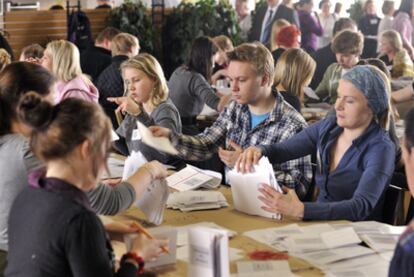Finland threatens Portuguese bailout
Growing number of Finns resent having to pay for the "errors of others"
As the Portuguese authorities continue to negotiate the terms of a bailout estimated at 80 billion euros with the IMF, their eyes are also looking thousands of kilometers to the north, aware that the economic future of Portugal may lie in the hands of the Finnish parliament.
The process of securing an accord on assistance from the European emergency fund set up for financially distressed euro-zone countries has been complicated by the strong showing of the euro-skeptic True Finns party in parliamentary elections held on Sunday. The populist party is unhappy with the financial bailouts handed out to Greece and Ireland, and the one currently being negotiated for Portugal.
The True Finns are in the mix to form part of a coalition government, a thorny process that is likely to drag on for weeks. The number of seats the True Finns won at Sunday's poll shot up from five to 39, and it came a close third to the conservative National Coalition party and the Social Democrats. Rescue packages have to be approved by the Finnish parliament.
The outgoing government, which was in principal to see the vote on Portuguese aid through parliament, decided on Wednesday to leave that hot potato to the incoming administration.
The idea was for an agreement on Portugal to be reached in early May and approved by a meeting of euro-zone finance ministers on May 16. Portugal faces heavy debt-redemption payments in mid-June and may need rescue funds to fulfill its commitments or face the prospect of a default, the impact of which would send shock waves through the single-currency bloc.
The mood in northern Europe is shifting against bailouts and during campaigning for Sunday's poll, the Social Democrats also made critical noises about aid.
The shift in sentiment was reflected by a letter from a Finnish taxpayer - who did not vote for the True Finns - published in the Financial Times on Wednesday that read: "While Finns diligently pay their taxes, as honesty is considered the backbone of society, I find it difficult to see my tax euros spent in supporting countries that have consistently lied to the European Union during the past decade about their economies and where tax evasion is a national hobby."
In an interview Wednesday with EL PAÍS, the head of the True Finns, Timo Soini, said the majority of Finns were unhappy about having to pay for "other people's errors." Although his party is not radically opposed to Portugal receiving aid, it wants the terms of any help to be modified.
"This is precisely what we are negotiating with the other parties in the coalition. Everything is on the table, but what is clear is that the terms cannot be the same as those before the election.
"To start, the size of the temporary rescue fund has to be reduced, but it is not only the amount. The aid mechanism has to be changed because it doesn't work. However, I also have it clear that I am not trying to create a stability crisis in Europe."
If the future coalition government manages to secure an agreement on aid for Portugal, Soini feels it would not be a "problem" getting True Finns deputies to vote in favor of it despite the heterogeneity of the group.
The populist leader wears his resentment about the failure of its European Union partners to comply with the rules of the European Stability and Growth Pact on his sleeve. "The Germans did not comply with it and the rest followed them. We are one of the few countries to fulfill the rules, and other countries want to come here and take the milk from our cows."
The European commissioner for economic affairs, Olli Rehn, himself a Finn, is fully aware of what is at stake. "Democracy and election results have to be respected," he told the daily Helsingin Sanomat in an interview published early Thursday. "But in parallel with that, the euro group must be able to make such decisions that prevent Portugal from drifting into insolvency."

Tu suscripción se está usando en otro dispositivo
¿Quieres añadir otro usuario a tu suscripción?
Si continúas leyendo en este dispositivo, no se podrá leer en el otro.
FlechaTu suscripción se está usando en otro dispositivo y solo puedes acceder a EL PAÍS desde un dispositivo a la vez.
Si quieres compartir tu cuenta, cambia tu suscripción a la modalidad Premium, así podrás añadir otro usuario. Cada uno accederá con su propia cuenta de email, lo que os permitirá personalizar vuestra experiencia en EL PAÍS.
¿Tienes una suscripción de empresa? Accede aquí para contratar más cuentas.
En el caso de no saber quién está usando tu cuenta, te recomendamos cambiar tu contraseña aquí.
Si decides continuar compartiendo tu cuenta, este mensaje se mostrará en tu dispositivo y en el de la otra persona que está usando tu cuenta de forma indefinida, afectando a tu experiencia de lectura. Puedes consultar aquí los términos y condiciones de la suscripción digital.








































